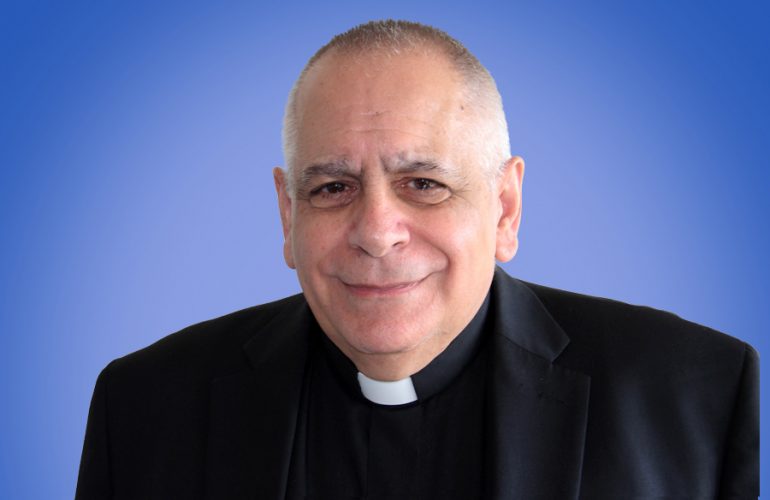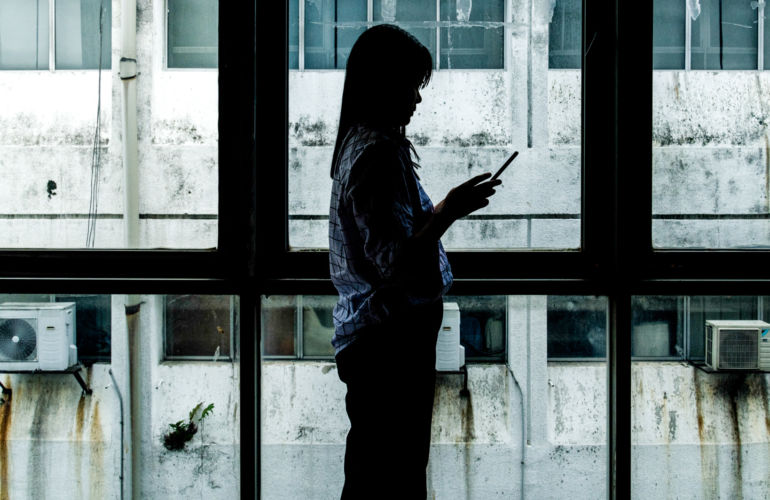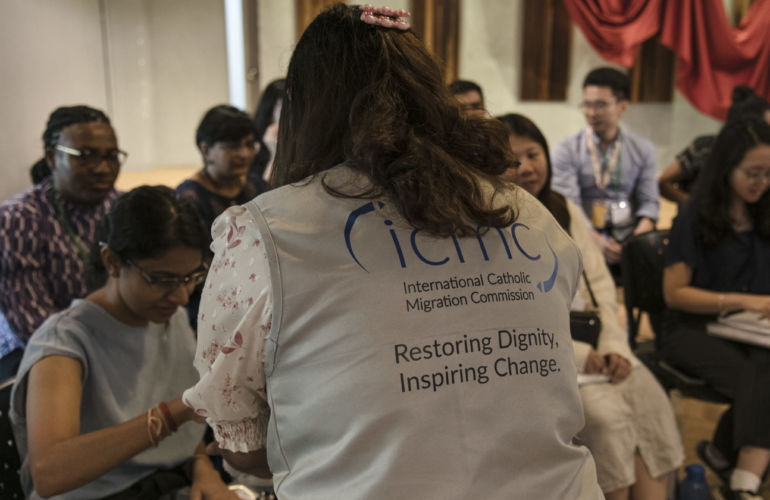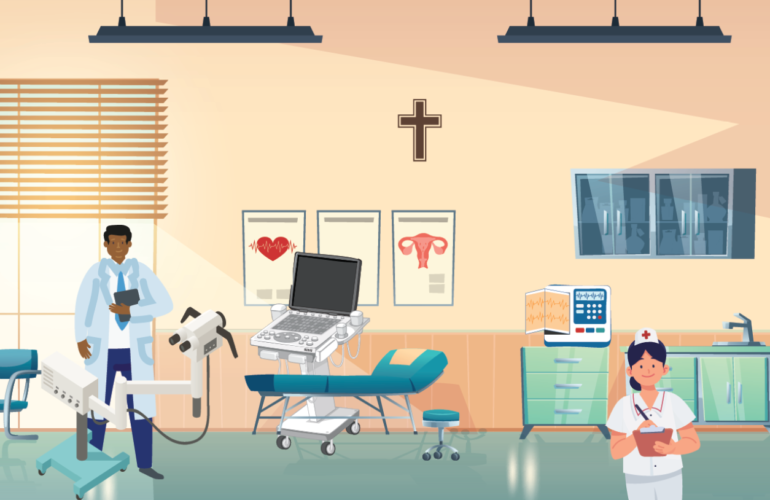The Sights, Sounds and Feelings When Meeting With Ukrainian Refugees and Displaced People
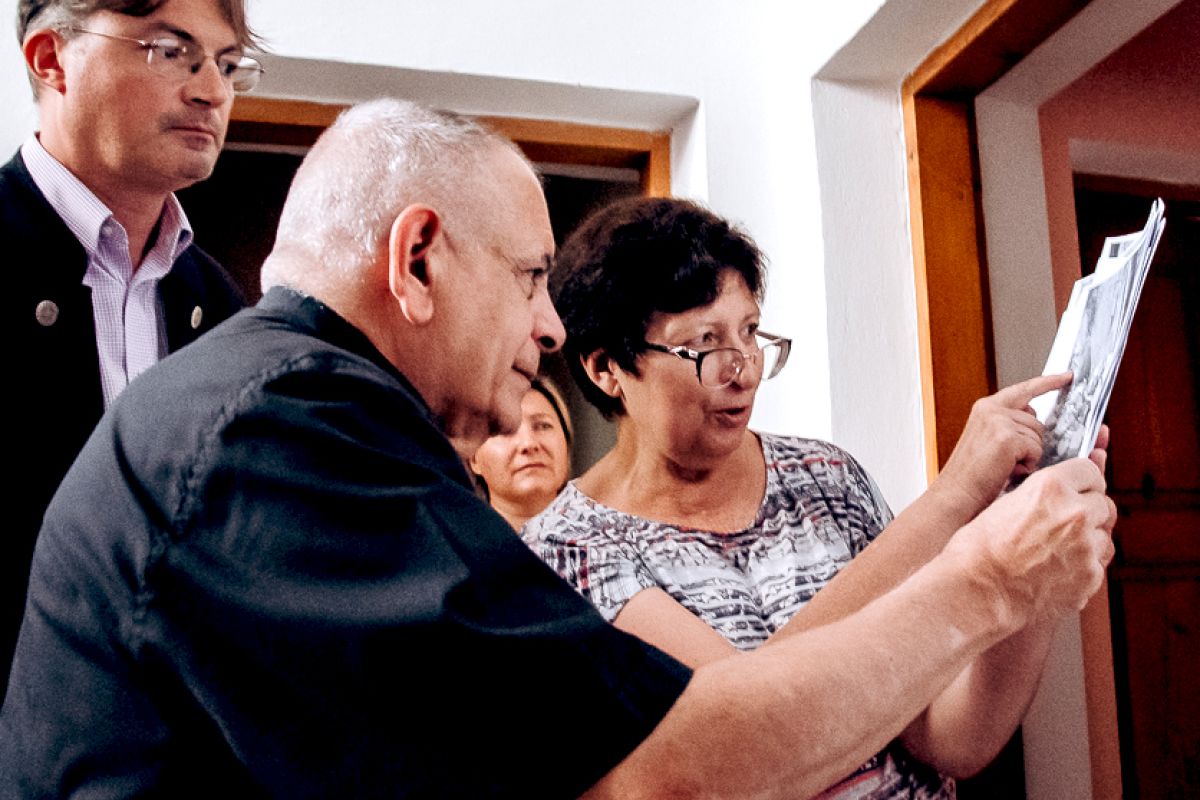
ICMC, representing the Catholic Response for Ukraine (CR4U) Working Group, visited Ukrainians in Poland and western Ukraine this week, in a show of solidarity with the people and those many faithful doing all they can to help people seeking refuge from the conflict.
As one who has been serving refugees, migrants, and internally displaced persons for the past 43 years, I feel as though I should be accustomed to such situations. And I remind myself, as well, that the International Catholic Migration Commission (ICMC), of which I am privileged to serve as Secretary General, has even longer experience in this field – 71 years to be exact. But then again, one can never consider such situations to be familiar, or routine.
As Pope Francis so frequently reminds us, refugees and displaced persons are never just numbers, statistics, “waves of new arrivals” – no, they are real, live, thinking, feeling, suffering but resilient people who deserve our complete and undistracted attention. And that is exactly why I decided to undertake this present trip to Poland and Ukraine. Some colleagues counseled me to postpone or cancel this travel – they cited issues of personal risk, of being perceived as a so-called “humanitarian tourist”, or simply presenting another burden to the first responders in Ukraine and in surrounding countries receiving the refugees from this senseless war.
Last Sunday, I felt a heavy responsibility as I boarded a flight to arrive first in Krakow, Poland. I was undertaking this travel to show the solidarity of ICMC as well as a Working Group of Catholic-inspired humanitarian organizations, including Caritas, Jesuit Refugee Service, the Sovereign Order of Malta, ICMC, DePaul International, Stella Maris, and the Knights of Columbus. My ICMC colleagues and I were hosted kindly by the Knights of Columbus, who briefed us extensively about the response of the Catholic Church in Poland. We then visited large convents of the Daughters of Charity of St. Vincent De Paul (associated with DePaul International) and of the Sisters of Mercy – both of which hosted upwards of 500 refugees each since February. The children tugged at our heartstrings as they proudly counted in Polish, sang of hymn of hope and praise to God despite their worries about the fathers left behind in Ukraine to serve in the military, whose lives were in danger each and every day. Their paintings told us the true story of their worries and fears – but also featured rays of sunlit hope as they imagined a new Ukraine that could enjoy peace and security once again.
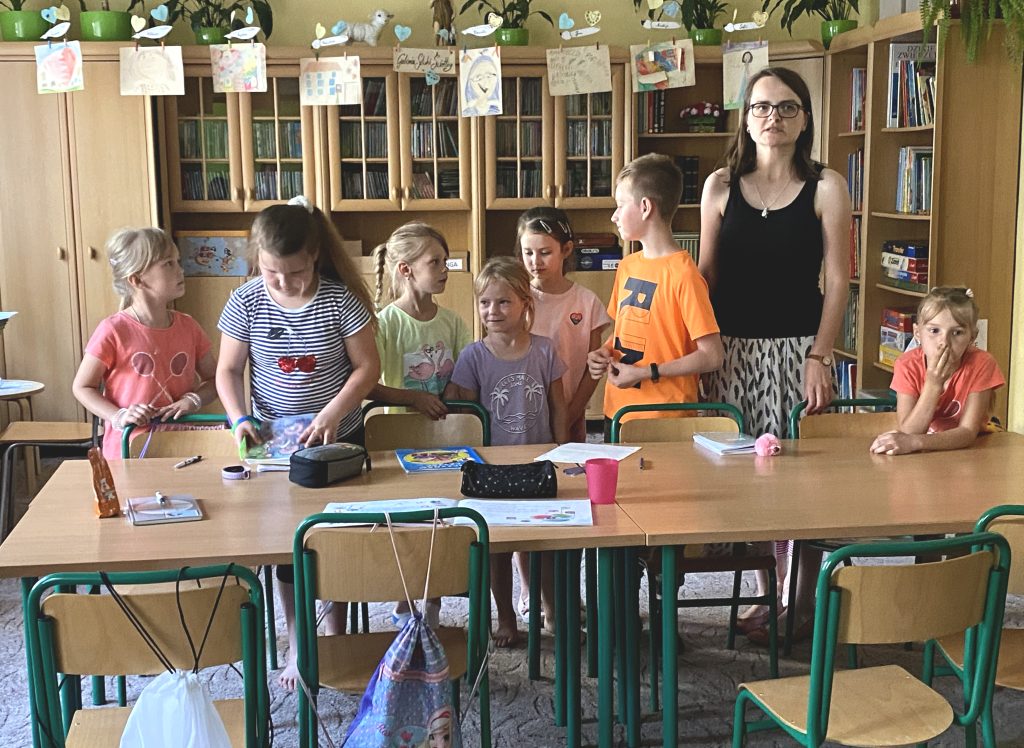
Then we visited a distribution site for food and hygiene items. People there had been waiting for hours in the hot sun and expressed their fears that the center would run out of items before they could be assisted. Finally, we visited a huge shelter for some 300 refugees – it was located in the former corporate offices of a supermarket chain. Many refugees were housed in large spaces, with little privacy. But amazingly, the refugees expressed gratitude for the safety and “quiet” of their surroundings.
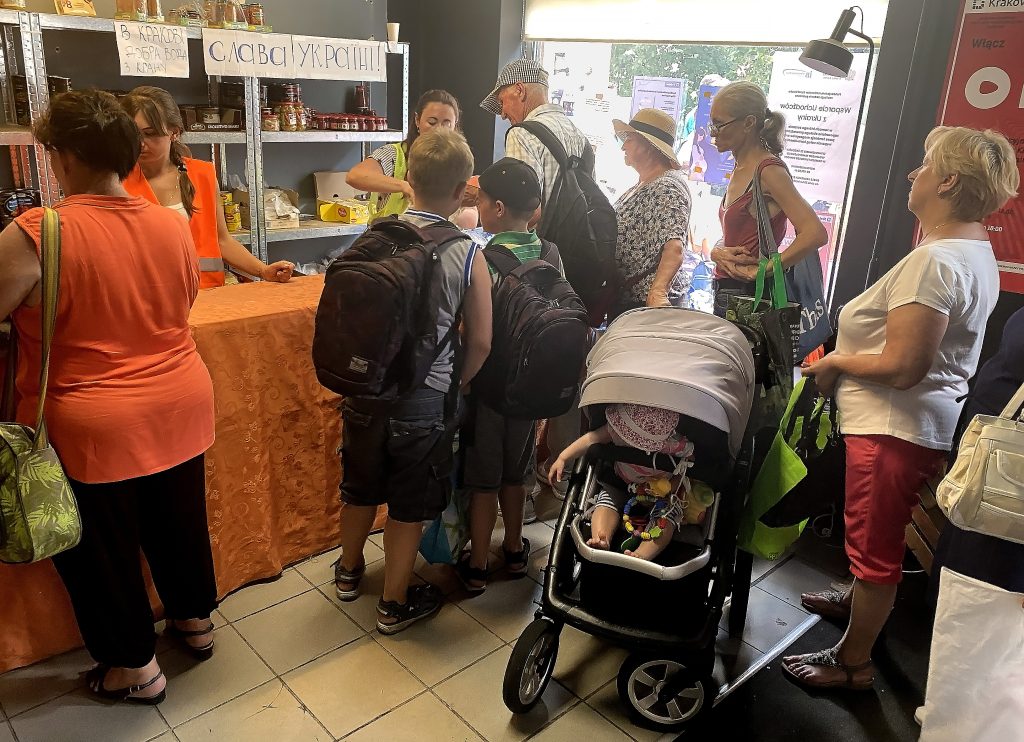
These reception and service centers had all benefited from the generosity of the Knights of Columbus, who help to provide essential medicines, food items, hygiene products and volunteer service. We also met a member of the Sovereign Order of Malta, a medical doctor, who volunteered at the large shelter at the supermarket’s former corporate headquarters. His smile and gentle spirit did much to calm the anxiety and uncertainty felt by many of the refugees.
Later that same day, we traveled by slow and much-delayed train to Przemyśl, Poland. There we met at the local Seminary, which was also hosting refugees, and then we were generously offered a ride over the border by the Latin Catholic Archbishop of Lviv. Shortly after crossing the border, we stopped at a newly constructed abbey of Benedictine monks. Within weeks after the arrival, the monks were joined by some 18 Benedictine Sisters who had to flee the capital city of Kyiv due to the repeated bombings at the beginning of the war. Then some 150 more displaced persons arrived!
The abbot of the monastery told us that he and his fellow monks learned an important lesson – “We have to be Christians first and then monks second.” He explained that in keeping with St. Benedict’s motto of “ora et labora (pray and work)”, the monks value quiet and orderliness of schedule. But that was not so easy while hosting so many refugees, so now the monks and the Sisters put the refugees first, listening to the needs of displaced persons, praying with them, taking them to doctors and other services, and still they find the time for fruitful and renewing prayer. We closed the day with meetings at the Greek Catholic Seminary – which was also busy hosting displaced persons mainly from Eastern parts of Ukraine well known from news reports, such as Mariupol, Kharkiv, Irpin and Donetsk, in the vacant rooms of the seminarians, who are currently on summer vacation.
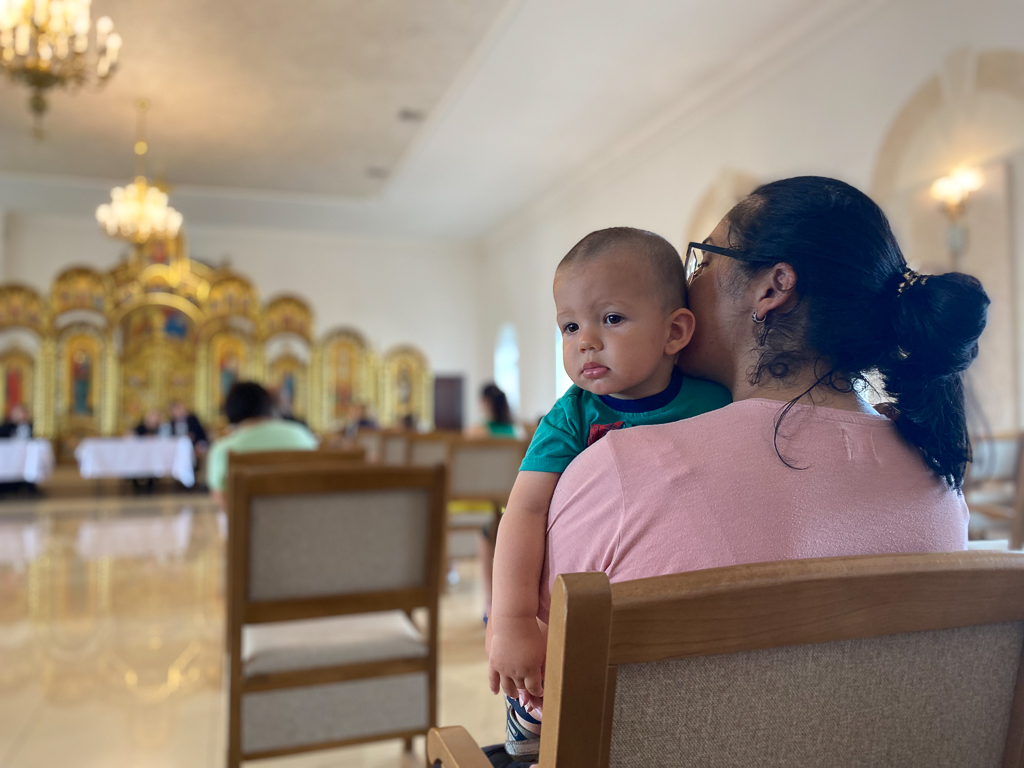
The third day of this trip involved a visit to Ivano-Frankivsk, about a two-hour drive from Lviv. Once again, the Knights of Columbus provided hospitality and showed us many programs sponsored by the Greek Catholic Church. Our first stop was at a huge seminary, serving as a medical clinic and food/hygiene items distribution point. One of the priests introduced us to a group of refugees who were gathered to welcome us in the chapel. He allayed all my worries about being perceived as a “humanitarian tourist” when he explained to the refugees that many representatives of helping organizations stay over the borders of Poland and other neighboring countries, but that we had come to Ukraine to personally express our solidarity and to assure them of our prayers.
I told the displaced persons that we had come to learn from them and had no prepared speeches for them. They expressed their gratitude to the local church for having been received with such gentle care. One woman pointed out that food and shelter was not enough since they also needed to ease their hearts, minds, and souls and that they had found much loving care at this seminary.
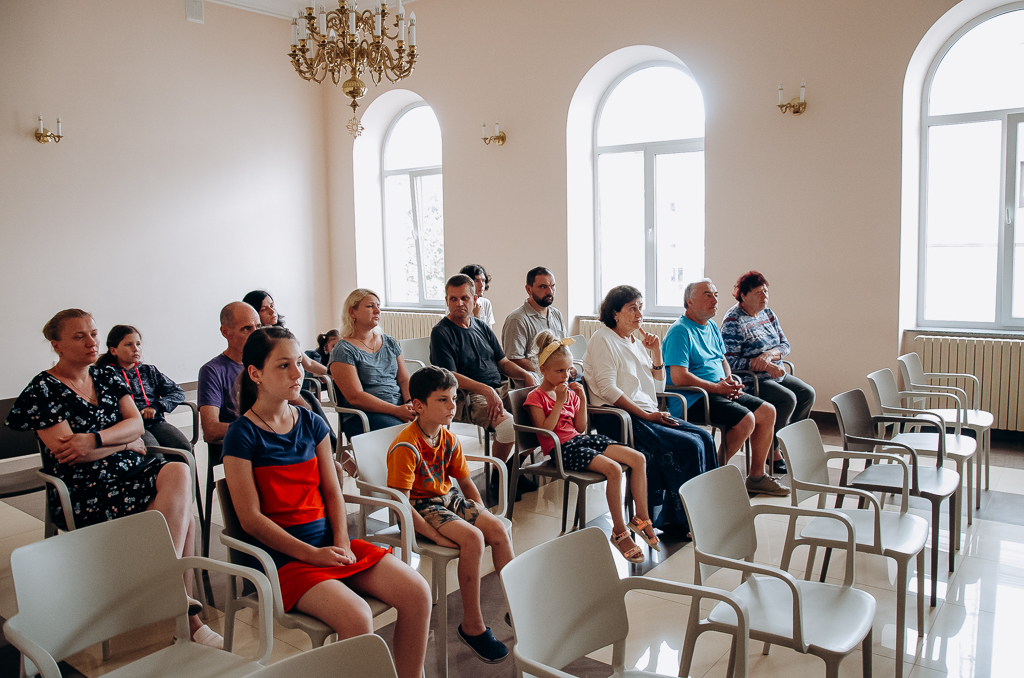
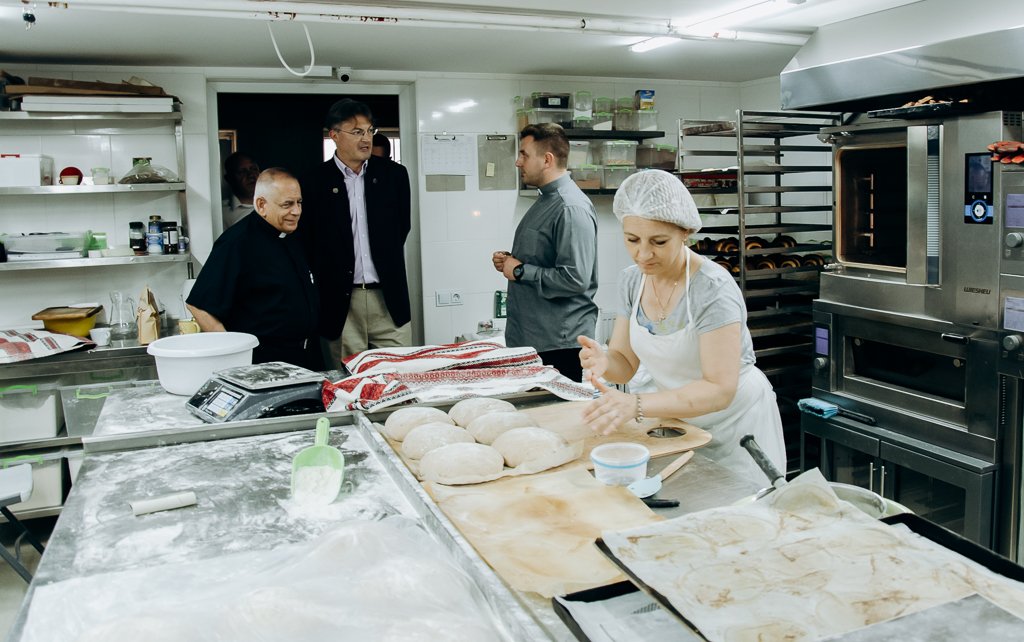
We heard similar stories at a local Church-run school. All the displaced persons were keenly aware that they would have to leave these facilities when school sessions would begin by mid-August. They pointed out the impossibility of returning to the East, which was now occupied by an invading power and noted that many of their homes had been completely destroyed. One couple brought out photos of their bombed home and said that they did not know how to start over again.
Some of the facilities provided by the local government were quite sparse – for example, a university dormitory housing hundreds of displaced persons – with only two toilets on each floor and not water and a gymnasium converted into dormitory space – which housed several gravely ill people but could not provide the specialized medicines which these persons desperately needed. Two disabled women were housed in a stuffy room that gave easy evidence of their inability to take care of personal needs – but even they expressed gratitude to have a protected and secure place to stay.
The sights, sounds, and feelings were not always easy to encounter today. But the tenacity and resilience of these forcibly displaced people renewed my faith in the human dignity that God gifted to each of them -despite the suffering and loss to which they have been subjected. So I close this night with a prayer for courage and strength for all those affected by this war in Ukraine and so many in other parts of the world and remain with hope that peace and harmony can be restored.
